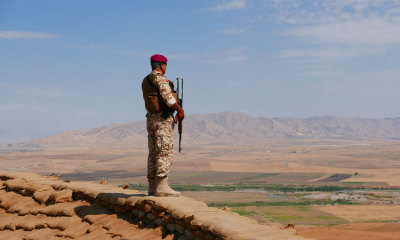If a studio ever wanted to distribute Bernard-Henri Lévy’s Peshmerga in America, they would just have to release the first two minutes as a trailer. In itself, it’s one of the most harrowing and striking sequences I’ve seen in a documentary in years. A single soldier of the Peshmerga—the military force controlling Iraqi Kurdistan who, along with Syrian Kurds, were the only troops facing ISIS in head-to-head combat—races up a hill to a fortification at the top. A man off-camera yells after him, telling him to be careful. Suddenly, the soldier vanishes in a puff of smoke as a mortar round makes a direct hit. It looks like a jump cut from one of Georges Méliès’ fantasies: he’s there one frame, a cloud of debris the next. But miraculously, the soldier comes crawling from the wreckage, his clothes partially blown off, his head caked in blood. He stands, walks a few yards, collapses on the ground. Before he loses consciousness, he yells in defiance “Long live Kurdistan!”
If they played up the fact that the Peshmerga are in large part responsible for the gains made against ISIS—which they refer to as Daesh, a term despised by the terrorist Islamic militants—a studio could probably put a lot of butts in seats. Much of the footage is savagely thrilling. During his six months spent on the front lines of the fight, Lévy gives us many stunning sequences of combat, hope, loss, and tragedy. More than once his crew gets bogged down in actual firefights. In one incident, one of his cameramen was almost killed after the jeep he was traveling in hit a mine. The blast immediately killed three Peshmerga soldiers, threw the cameraman from the jeep, and nearly ripped his left arm off. And, of course, Lévy shows us the cameraman’s recovered footage of the incident. But then, much of the footage isn’t for the squeamish: in addition to including graphic footage of Daesh executing civilians, Lévy fills the screen with dead bodies, wounded soldiers, and men rushing to their certain doom, including one segment where they cut away from the footage of a gray-haired general seconds before he gets shot in the head.
And yet, for all the brilliance of its footage, for all the inconceivable bravery of the men and women who made the documentary, Peshmerga is both insufferable as a documentary and downright insulting as a tribute to the men and women risking their lives against Daesh. The problem is Lévy himself. Lévy, one of France’s most prominent and distinguished living intellectuals and philosophers, felt inclined to highlight every single moment of his film with grandiose, grandiloquent narration. His narration isn’t just poetic, it’s the syrupy prose of a narcissist in love with his voice, convinced that every blessed syllable that drips from his golden tongue is destined to delight and enlighten all mankind. It’s not enough to pan the camera over the faces of shell-shocked civilians rescued from bondage, he must philosophize about the loss of innocence during war. He can’t just boast about the indefatigable bravery of the Peshmerga, he has to chide Daesh militants as cowards who only know how to terrorize, not wage war. Well, if that’s the case, Mr. Lévy, how has Daesh managed to fight off several of the world’s most powerful militaries for years? If these Peshmerga are the invincible warriors you proclaim them, how do Daesh keep deflecting their advances and regrouping?
Nowhere was the short-sightedness of Lévy’s poetic waxings more infuriating than a scene where Peshmerga forces fly a drone over Mosul, Daesh’s de facto capital, to gather intel. Lévy solemnly intones that Mosul is a “City of Evil” that must be destroyed. Mr. Lévy, you realize that there are hundreds of thousands of innocent civilians being terrorized there, or should they all be thrown out with the rest of the chaff when the city is eventually retaken?
And what about the fact that the film seems obsessed with portraying the Peshmerga as righteous heroes—enemy of extremists, friend to both local Christian, Jew, and Yazidi? Lévy fails to mention that the Peshmerga have been decried by Amnesty International for the mass destruction of Arab villages in Iraq. But then, that doesn’t fit Lévy’s narrative, so why should he include it? He’s much too busy rhapsodizing over Helly Luv, the “Kudish Madonna” who makes “morale-boosting” music videos for the Peshmerga. When she first appears, all decked out with red hair and pierced nose, you’d think Lévy was describing an encounter with the Virgin Mary. Never you mind the countless female Peshmerga who risk their lives every day—they get only a few minutes of screen-time and some phoned in statements about how they’re “fighting for equality.”
I wish somebody like Werner Herzog could get a hold of Lévy’s footage so he could re-edit and re-narrate it. It’s abominable that such crucial documentation was wasted on a film that devolves into a road-trip scrapbook serving Lévy’s own sense of self-importance. The entire time I watched it, I couldn’t stop thinking of a line from Roger Ebert’s Great Movies essay on Dennis Hopper’s Easy Rider (1969):
Then they have dinner with the weathered rancher and his Mexican-American brood, and Fonda delivers the first of many quasi-profound lines he will dole out during the movie: "It's not every man who can live off the land, you know. You can be proud." (The rancher, who might understandably have replied, "Who the hell asked you?" nods gratefully.)

No comments:
Post a Comment